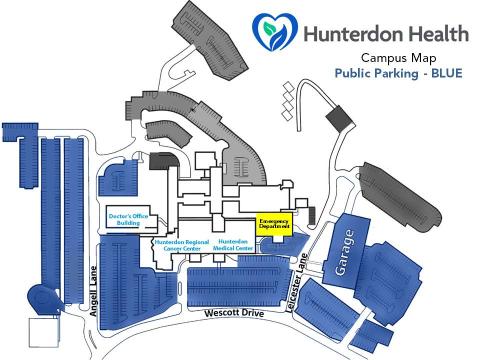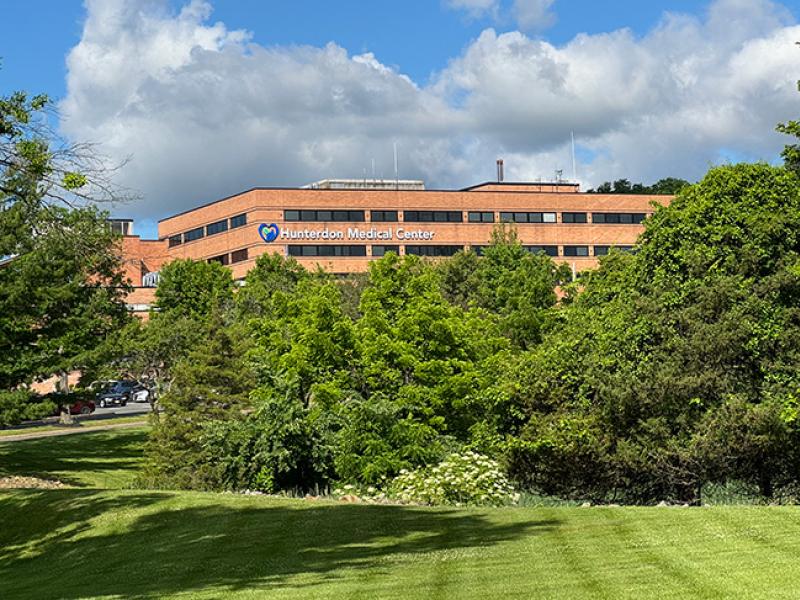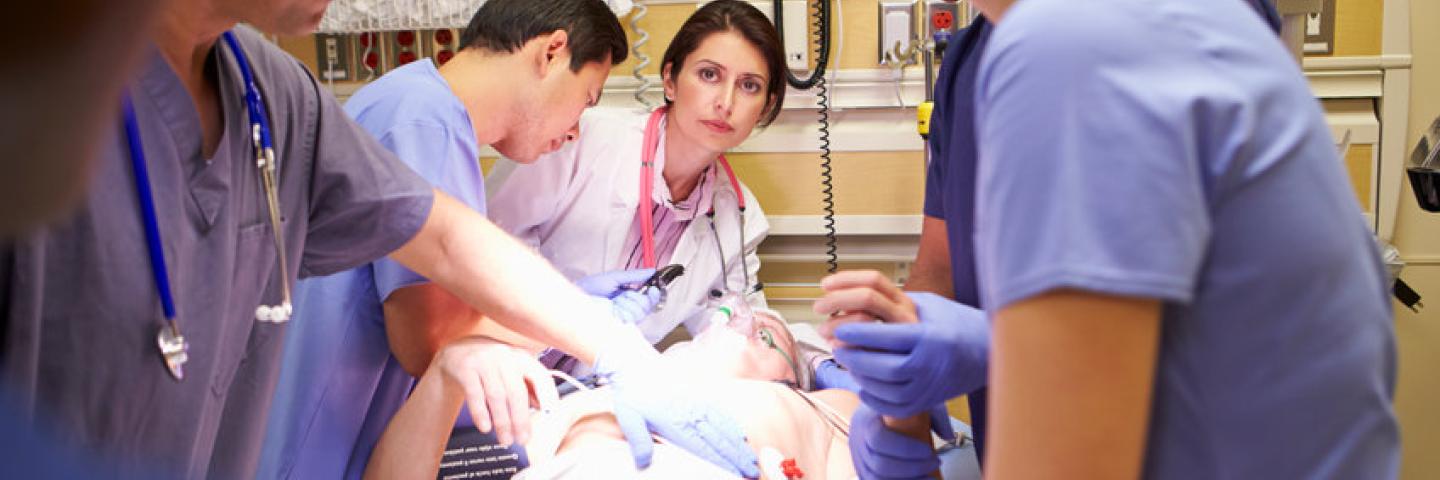
Emergency Services
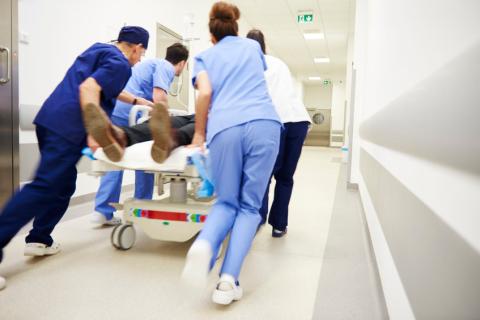
Hunterdon Medical Center’s Emergency Department provides exceptional care to more than 27,000 adult and pediatric patients each year experiencing a heart attack, stroke, trauma or severe and life-threatening illnesses and injuries. The Emergency Department is open 24 hours a day, seven days a week, and is available to all people in need from all over Hunterdon County, as well as patients from Somerset, Warren and Mercer counties, and eastern Pennsylvania.
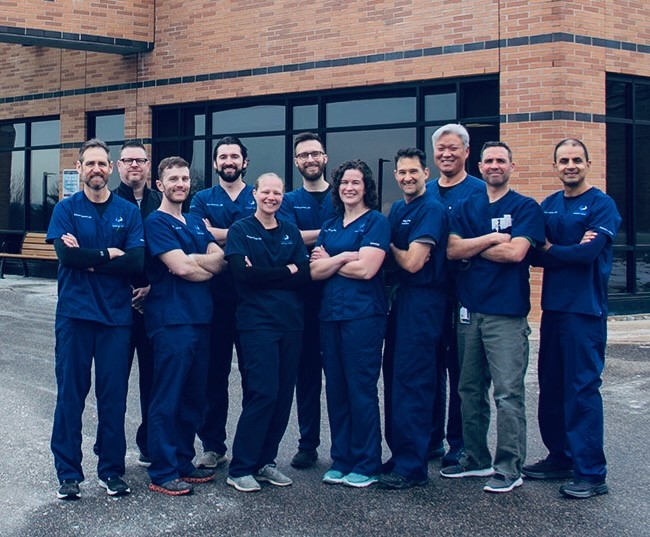
Emergency Care
In the event of a heart attack, every second counts.
Hunterdon Medical Center’s Emergency Room provides exceptional care to patients experiencing a heart attack or acute limb ischemia (a vascular emergency). We have the most advanced technology to treat cardiac, vascular and pulmonary patients. Hunterdon Medical Center’s state-of-the-art Emergency Room includes 22 private patient care areas equipped with the latest cardiac monitoring and diagnostic equipment. With a comprehensive communication system, the entire emergency services team is able to identify, diagnose, and treat patients before they even get to the hospital.
Timing is critical, and reducing the time between a patient’s arrival in the ER and an emergency angioplasty procedure (“door-to-balloon” time) can positively affect patient outcomes. Hunterdon’s team of board-certified interventional cardiologists, ER doctors and nurses provide emergency angioplasty for heart attacks – a procedure that quickly opens clogged arteries and restores blood flow and oxygen to the heart. Hunterdon prides itself on consistently exceeding the national “door to balloon” time of less than 90 minutes, with an average time of less than 60 minutes. In exceeding this national average, Hunterdon’s care positively affects patient outcomes. Only state-licensed facilities, like Hunterdon Medical Center, can offer this procedure, which has been proven to reduce mortality rates in heart attack patients.
EKG data is transmitted, en route, from the MICU to the Lifenet Receiving Station in the Emergency Department, where physicians and staff can monitor. The ER doctor interprets the EKG and institutes the AMI (acute MI – Heart Attack) protocol. The interventional cardiologist and cath lab team are notified. This enables the interventional cardiologist to prepare in advance of the patient’s arrival, allowing them to begin the procedure as promptly as possible.
Recognizing the Signs of a Heart Attack
If you experience any of the symptoms listed below, CALL 9-1-1 immediately:
- Chest pain: Most heart attacks involve discomfort in the center of the chest that lasts more than a few minutes, or that comes and goes. This can be pain, fullness, and squeezing, uncomfortable pressure, or even crushing pain.
- Discomfort in other areas of the upper body: These symptoms can include pain or discomfort in the jaw, neck, back, one or both arms, and stomach.
- Shortness of breath: This may occur with or without chest discomfort.
- Other symptoms: Other signs of a heart attack may include nausea, lightheadedness, or breaking out in a cold sweat.
- Fatigue, not feeling well: Women, the elderly, and people with diabetes may experience atypical symptoms of just not feeling well or an extreme sense of tiredness.
We provide lifesaving treatment to stroke victims when they need it most – within 3 hours of their first stroke symptoms. This designation is based on Hunterdon’s advanced capabilities and protocols for the rapid and effective treatment of stroke patients.
In 2021, Hunterdon Medical Center earned The Joint Commission’s Gold Seal of Approval® and the American Stroke Association’s Heart-Check Mark for Primary Stroke Center Certification. Hunterdon Medical Center earned The Joint Commission’s Gold Seal of Approval® because the hospital meets and exceeds rigorous standards and performance measures for patients experiencing a stroke. Achievement of this certification signifies that Hunterdon Medical Center provides the critical elements to achieve long-term success in improving outcomes.
Additionally, since 2008 Hunterdon Health’s Emergency Department has been designated a Primary Stroke Center by the New Jersey Department of Health and Senior Services. This designation is based on Hunterdon’s comprehensive capabilities to rapidly identify, evaluate and treat stroke patients. Our healthcare professionals are specially trained in the diagnosis and treatment of stroke. Board-certified neurologists and neurosurgeons are on call at all times.
Because immediate care is critical to a stroke patient’s survival and recovery, Hunterdon Health utilizes sophisticated TeleNeurology services to immediately connect stroke patients with a neurological specialist. Using this audio/video device allows our emergency department physicians to have our on-call neurologist remote into the room from anywhere to help evaluate the patient. This device allows the physician to conduct the same interactive neurologic exam as if they were physically in the room with the patient. During the consultation, the emergency physician relays the findings and shares images so both specialists can discuss the best treatment plan for the patient.
Learn more about HMC's Stroke Program.
Recognizing Signs of Stroke
Please note that not all the warning signs occur in every stroke and every stroke may look different. Any of these signs or symptoms may be that of stroke.

A stroke is considered a medical emergency. If you think someone may be having a stroke, B.E.F.A.S.T. and do this simple test. Call 9-1-1 immediately:
- Balance: Is the person off-balance or dizzy?
- Eyes: Is the person experiencing double vision, blurred vision or other disturbances?
- Face: Ask the person to smile. Does one side of the face droop?
- Arms: Ask the person to raise both arms. Does one arm drift downward?
- Speech: Ask the person to repeat a simple sentence. Are the words slurred? Can they repeat the sentence correctly?
- Time: If the person shows any of these symptoms call 9-1-1. Time lost is brain lost.
Emergency Mental Health Services can be accessed through the Emergency Department which features a secure, private surveillance room for patients with mental health emergencies. This room enables our psychiatric team to stabilize and care for patients in a safe environment separate from the rest of the department.
Potential patients receive medical clearance from Emergency Department physicians, who then call for a behavioral health consult from Hunterdon Medical Center’s crisis clinicians. The Psychiatric Emergency Service at Hunterdon Behavioral Health is a Screening Center for Hunterdon County.
Emergency services are available 24 hours a day, 7 days a week. Our highly trained staff has extensive experience in crisis intervention strategies. Patients can be referred to community agencies as well as to Hunterdon Behavioral Health, upon completion of emergency services.
For more information about Hunterdon Medical Center’s Emergency Department, call our 24-hour Crisis Hotline at 908-788-6400. For more information about Behavioral Health, contact your family physician for a referral, or call toll-free 1-866-HBH-2060.
If you are experiencing an emergency, call 9-1-1.
Hunterdon Health’s Emergency Department provides patients with an acute medical need initial medications for Opiate Use Disorder (MOUD). Suboxone is only for patients who are in acute withdrawal based on evidence based screening guidelines. Hunterdon Behavioral Health’s Opioid Overdose Recovery Program will work with patients to coordinate care in the community for continued MOUD coverage.
Support Services for Addiction:
Hunterdon Behavioral Health Addiction Treatment Services: 908-788-6400
New Jersey Addiction Helpline: 1-844-732-2465
Substance Abuse and Mental Health Services Administration: 1-800-662-4357
About Medications for Opioid Use Disorder (MOUD)
Medications for Opioid Use Disorder (MOUD) is an evidence-based approach for treating opioid use disorder. Research has shown the following benefits of MOUD treatment:
- Reduced cravings
- Reduced opioid use
- Reduced risk of death from opioid overdose
- Increase engagement in treatment.
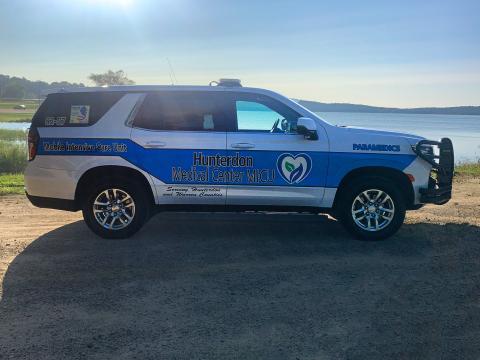
We coordinate emergency services with local paramedics.
This state-of-the-art emergency medical system works closely with four Mobile Intensive Care Units (MICUs) located in Raritan Township, Glen Gardner, Lambertville and Lopatcong Township that act as an extension of the ER to assess and treat patients before they arrive at the hospital.
Each MICU vehicle has state-of-the-art equipment which allows the Paramedics and Nurses to provide care and treatment to those facing life-threatening emergencies. This care is rendered in conjunction with the Emergency Department Physicians at Hunterdon Medical Center via voice communications whether in the home, en route to the hospital, or wherever the patient care is needed.
Following New Jersey law, paramedics can begin patient treatment under state-sanctioned “Standing Orders” thereby initiating life-saving treatment in the field as quickly as possible. The Emergency Department Physician is then consulted for further orders and care plans for transport to the most appropriate facility. In many cases, that is the closest emergency room. In the case of an allergic reaction, heart attack, stroke, asthma, or congestive heart failure, every second counts. The key to emergency care is “the sooner, the better” for an improved patient outcome.
The Hunterdon Medical Center MICU team of pre-hospital responders was the first in New Jersey to administer Retavase – a clot-busting drug – to heart-attack patients during their transport. More recently, the MICU was a national pioneer when it introduced Brilinta, an anti-platelet medication to the field for heart attack patients. These patients are then delivered to Hunterdon Medical Center’s state-of-the-art, Norman and Denise Guilloud Cardiovascular Center for evaluation and in many cases receive a cardiac catheterization procedure, in many cases, terminating the heart attack.
The Hunterdon Medical Center MICU also serves as a learning resource, providing regular training opportunities in the latest emergency medical procedures for Emergency Medical Technicians (EMTs) in surrounding counties.
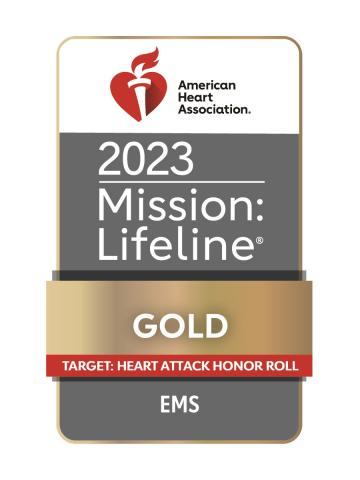
Hunterdon Medical Center’s Mobile Intensive Care Unit (MICU) has received the American Heart Association’s Mission: Lifeline® EMS Gold achievement award for its commitment to offering rapid, research-based care to people experiencing the most severe form of heart attack, ultimately saving lives. Hunterdon Medical Center’s MICU was also recognized with the American Heart Association’s Mission: Lifeline System of Care Target: Heart Attack award, focused on the system of care for patients. This award highlights the collaboration and contributions of both pre-hospital and hospital providers. This time-critical award level is limited to those agencies that provide patient transport to STEMI-receiving and STEMI-referring centers.
The Emergency Department is open 24 hours a day, 365 days a year, and is staffed round-the-clock by board-certified emergency physicians, physician assistants, and nurses who are trained in trauma, emergency care, and disaster preparedness.
The ED staff also includes nationally recognized Magnet™ nurses, specially trained in emergency medicine.

The emergency physicians, physician assistants, and nurse practitioners are employed by Pegasus Emergency Group.
Pegasus Emergency Group has been selected fourteen years in a row for the Best of Flemington Awards for Medical Services Organization 2: U.S. Commerce Association Awards and now qualifies for the 2022 Flemington Business Hall of Fame. The Flemington Award Program is an annual awards program honoring the achievements and accomplishments of local businesses.
View our Emergency Services Providers

Visitation
Please see the most recent Visitor Policies during COVID-19.
Visiting hours in the ER is dependent upon the volume and acuity of patients within the department at the time. Patients will be allowed up to two visitors whenever possible. Visitors will be asked to wait in the waiting room during the triage process and the initial evaluation and assessment of the patient. Parents or guardians of pediatric patients will be kept with the patient at all times unless separation is necessary for the patient’s safety. Visiting Behavioral Health patients will be at the discretion of the Emergency Department and Behavioral Health Emergency Services staff. Visiting forensic patients is strictly at the discretion of the custodial officers accompanying the patient.
Discharge
All patients discharged from the Emergency Department at Hunterdon Medical Center will receive information about your medical condition and recommendations regarding follow up care. This information will include written instruction sheets, as well as verbal instructions regarding diagnosis, prescribed medications, and appropriate follow up care. Do not hesitate to ask your nurse if you have any questions about your instructions. If you have any questions regarding care after discharge, please feel free to return or call your doctor. Emergency Department nurses are unable to provide medical advice over the phone.
Campus Map
Testimonials
Two weeks ago, we wound up back in the ER with my son again who was having some breathing difficulties. After triage, Erin walked into the room, and right away I knew we were in the best hands possible. My son also calmed down when he saw Erin. She was able to quickly get him settled, run some tests, and get him the medication needed to help ease his breathing difficulties. Again, she was so patient with my son and me and I left knowing that we had received the best care possible.
I can’t thank Erin enough for the amazing care my son received. I work in the healthcare field and I have never come across someone so passionate about their job. She was diligent and efficient while showing compassion for both my son and I. I hope we don’t wind up in the ER again, but if we do I pray that Erin is there to take care of us. Thank you, Erin!

